The Upstart, the Speaker, the Scandals, and Scotchtown
The rustic Henry rises
by Alan Pell Crawford
Editor’s Note: In his Autobiography, Thomas Jefferson wrote: “So inscrutable is the arrangement of causes & consequences in this world that a two-penny duty on tea, unjustly imposed in a sequestered part of it, changes the condition of all its inhabitants.” Had he still lived, an inhabitant named Patrick Henry, Jefferson’s old nemesis, could have appreciated the application of the idea to his own condition, though the tax in his case had not to do with tea but with stamps.
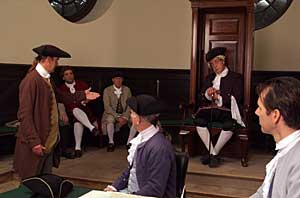
“What, Sir? Is it proposed to reclaim the Spendthrift from his dissipation and extravagance by filling his pockets with money?” Patrick Henry, personified by Richard Schumann, challenges Speaker John Robinson, portrayed by Donald Coleman, in the House of Burgesses. Interpreters Brett McMichael, Starr Galloway, and Joseph Musika look on. - Dave Doody
Patrick Henry had been a burgess for about three days when he first took a seat among the four wooden benches in the long rectangular chamber of the House. The session had opened nearly three weeks before, on the first of May, but it took until the seventeenth to arrange Henry’s election, and he didn’t reach Williamsburg until the twentieth. He missed nothing that mattered to him; he came with a legislative agenda of his own.
Henry was not the first choice of his Louisa County constituents-his predecessor had been induced to resign to create a vacancy for him-and he had lived in that district for barely seventeen months. Nevertheless, by reputation if nothing else, he was known to the voters, as well as a few of his new colleagues.
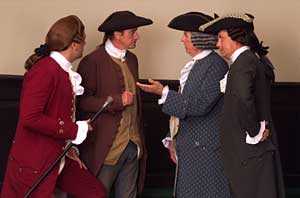
Portraying the rustic Patrick Henry
of 1765, Richard Schumann, second from left, debates a point of
politics with interpreters Brett McMichael, Louis Vosteen, and
Joseph Miller dressed in the gaudy finery of grandees and his
Tidewater gentry betters.
- Dave Doody
He had been making a name for himself as an attorney. His polemical powers had come to notice in the Piedmont in 1763 when he tried the Parson’s Cause in Hanover, his home county, and had the temerity to criticize the king. During the General Assembly of 1764 he had appeared as counsel in an election dispute. One burgess remembered Henry for his “very coarse apparel.” Another recalled “an ill-dressed young man sauntering in the lobby” who “seemed to be a stranger to every body.”
To the great men of the colony-the Tidewater planters who ran the government-Henry presented himself as a rustic, but he was a rustic who intended soon to be a stranger to nobody. His ambition was to become as prosperous as the best of them, to own a plantation as large as any, and to be remembered for an advocate who “delivered an argument superior to any thing” heard before in those halls.
Now, on May 23, 1765-three days shy of his twenty-ninth birthday-the come-lately, up-country freshman rose to embroil himself in a dispute with the most powerful man in the chamber, John Robinson, the speaker of the House and treasurer of Virginia, a man of multiple plantations, mansions and wealth. In that moment, by an inscrutable chain of causes and consequences, Henry’s reputation and fortune began their ascent even as Robinson’s slipped toward ruin. So far would their positions change that when events played out, Henry would hold the reins of power and live on one of Robinson’s best manors, Scotchtown.
Speaker since 1738, Robinson practiced politics with diligence and parliamentary skill. From the towering gabled chair at the chamber’s south end, he presided over the House’s affairs, acting almost always in the interests of the Virginia gentry. A Beverley on his father’s side and a Randolph on his mother’s, he was among the best blooded of the Tidewater breed, owned 20,000 acres, and commanded 400 slaves. Known to irreverent burgesses as the Bashaw-a Turkish term for grandee, or a haughty, imperious man-he was corpulent and sleepy-eyed, exuded self-satisfaction, and was suave and charming, even to upstarts like Henry. Keeper of the colony’s purse as well as superintendent of its politics, Robinson was a person of nearly unrivaled influence and authority. Almost single-handedly, Robinson was discretely helping to prop up Virginia’s failing tobacco economy, quietly lending large and small sums to friend and to foe, few of whom were or soon would be in a position to pay him back.
The plantation system was on a precipice. Prices for the colony’s staple crop, against which planters borrowed to finance their affairs, had fallen steadily while their debts to English merchants mounted. Creditors preferred payment in scarce English sterling-but Virginia’s primary currency was discounted colonial paper. Issued by the colony to pay public expenses, after a few years of circulation it was retired in payment of taxes and fees.
Reckoning on an eventual recovery and new issues of paper, many gentlemen, and some of them the best, went on freely spending and heedlessly borrowing. As good an example of the lot as another was Robinson’s father-in-law, Colonel John Chiswell, a Williamsburg resident, former burgess, and Hanover County planter.
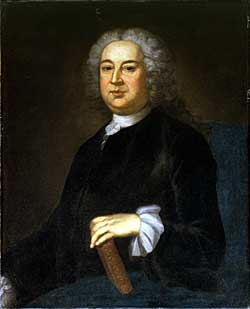
Colonial Williamsburg
Speaker John Robinson, painted by John Wollaston Jr. circa 1756, was, his friends found, generous to a fault.
Chiswell-the “w” is silent-had been trying, and failing, to turn a profit on his crops and a New River lead mine he discovered in 1757 in what was then Augusta County. To keep his enterprises afloat, he borrowed money and sold shares to, among others, Robinson, William Byrd III, Williamsburg’s George Wythe, and Robinson’s protégé Edmund Pendleton. Robinson married Chiswell’s eldest daughter, Susannah, in 1759, and the next year, to help Chiswell meet pressing obligations, Robinson bought some of Chiswell’s property. Among it was the family plantation in northern Hanover County, the aforementioned Scotchtown, built about 1730 by the colonel’s father. Then, like most gentlemen of the day, the insolvent Chiswell went on accumulating debt.
Robinson hoped to stave off disaster and bankruptcy-not just for individuals like his father-in-law but for Virginia-by, in effect, arranging for the colony to take over and refinance the planter debt. The idea was Pendleton’s. The scheme was described for the House and the public in the Virginia Gazette the day Henry was elected.
The colony would borrow £240,000 in gold from the creditor English merchants and use £100,000 of it to retire outstanding paper, primarily currency issued to meet expenses from the French and Indian War. The other £140,000 would go to a loan office to back notes that agency would issue at 5 percent to individuals with “good landed security.” A fourteen-year general tax on tobacco exports would pay interest on the £240,000 loan and meet sinking fund payments.
The plan would buy time for gentlemen planters-the people with “good landed security”-by shifting the burden of their imprudence to the public. Their profitless acres-frozen assets-were the only security required. The inequities of the scheme were plain. Richard Corbin, a member of the Governor’s Council, wrote, “To Tax people that are not in Debt to lend to those that are is highly unjust, it is in Fact to tax the honest frugal industrious Man, in order to incourage the idle, the profligate, the Extravagant & the Gamester.”
Nevertheless, the loan office bill was moving full speed toward approval in the House. To stop it, Henry took to his feet to make his first speech as a burgess. “What, Sir?” he said. “Is it proposed to reclaim the Spendthrift from his dissipation and extravagance by filling his pockets with money?”
The bill, however, passed the House, only to be killed by the Council. The next time Henry rose, he would, as Thomas Jefferson recollected, give “the first impulse to the ball of the revolution.”
On May 29, the burgess from Louisa introduced seven surprise resolutions against the Stamp Act, the mother country’s initial attempt to tax her colonies directly without their consent. Drafted with the help of such young turks as John Fleming of Cumberland County, the resolutions came before the House, sitting as a committee of the whole, the next day. Peyton Randolph was in the chair, and Henry was again on his feet. Henry’s biographer William Wirt wrote:
It was in the midst of this magnificent debate, while he was descanting on the tyranny of the obnoxious act, that he exclaimed, in a voice of thunder, and with the look of a god, “Cæsar had his Brutus-Charles the first, his Cromwell-and George the third-(‘Treason,’ cried the speaker-‘treason, treason,’ echoed from every part of the house.-It was one of those trying moments which is decisive of character.-Henry faultered not for an instant; but rising to a loftier attitude, and fixing on the speaker an eye of the most determined fire, he finished his sentence with the firmest emphasis) may profit by their example. If this be treason, make the most of it.”
Jefferson, with his friend John Tyler, was listening at the door. He said Henry “appeared to speak to me as Homer wrote.” The burgesses adopted five of the resolves. The fifth, and most pointed, passed by one vote. It read: “That the general assembly of this colony have the sole right and power to lay taxes and impositions upon the inhabitants of this colony; and that every attempt to vest such power in any person or persons whatsoever, other than the general assembly aforesaid, has a manifest tendency to destroy British as well as American freedom.”
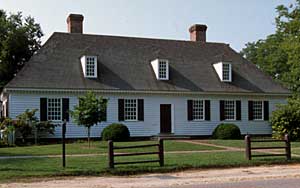
Colonel John Chiswell’s home,
the Chiswell-Bucktrout House, still stands on Francis Street,
restored by Colonial Williamsburg.
- Ellen Rudolph
Randolph stormed out the door saying, “By God, I would have given one hundred guineas for a single vote.” That would have created a tie for Speaker Robinson to break in the favor of the crown. The next day, after Henry had ridden for home, the fifth resolve was expunged. All seven, however, were reprinted as if passed, in newspapers north and south-though not in Williamsburg. As Wirt wrote, Henry became “the idol of the people of Virginia; nor was his name confined to his native state. His light and heat were seen and felt throughout the continent; and he was every where regarded as the great champion of colonial liberty.”
Almost a year later, on May 11, 1766, Robinson died. His finances were poorly documented, but as his family and his executors struggled to make sense of them and the books of the colony’s treasury, they discovered debts of more than £138,000.
Robinson’s obituary in the Gazette read, in part:
The many amiable virtues which adorned his private station, whilst they consecrate his memory among his friends, dependents, and acquaintance mark his death as a calamity to be lamented by the unfortunate and indigent who were wont to be relieved and cherished by his humanity and liberality.
The eulogist said more than he knew. Robinson had loaned a great deal of money to his friends, which they had not repaid. Burgesses had received a total of £37,000. Chiswell’s lead mine was down for £8,085. John Randolph, Peyton’s brother, owed £996, and Pendleton £1,020. Henry was down for £11. Even before Robinson died, there had been gossip that not all of the money he lent was his.
In June the Gazette published a notice from the executors, written by Pendleton, asking Robinson’s friends to make immediate repayment. Out of the goodness of his heart, Pendleton said, Robinson had advanced “large sums of money to assist and relieve” his associates, and Pendleton hoped they would clear their accounts “without further trouble or application.”
Poring over the books, Pendleton found Robinson had lent without authorization more than £100,761 7s 5d from the public coffers, and taken for it no security. Most of the loans had been in the form of retired notes-paper money that he was supposed to have burned as it was turned in. Robinson’s estate, Pendleton realized, was obligated to the colony for those funds. Few of the borrowers, however, had the wherewithal to pay without liquidating their plantations. Moreover, if they all put their lands at once on the market, all property values would plummet, serving neither them nor Robinson’s estate nor Virginia’s treasury.
The seriousness of these financial predicaments brought the loan office scheme back to mind and cast on it a new and disagreeable light. But the public’s attention was quickly captured by another scandal.
Colonel Chiswell, visiting his lead mine, stopped June 3 at Ben Mosby’s Tavern near Cumberland Court House and fell into an argument with his friend, the popular merchant Robert Routledge. Insults were exchanged. By some accounts, Chiswell ran Routledge through with a sword and said, “He deserves his fate, damn him. I aimed at his heart and I have hit it.” By other relations, Routledge, drunk, fell on the blade. In either case, Chiswell was arrested and jailed.
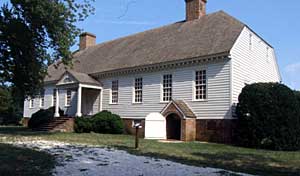
Now an Association for the Preservation
of Virginia Antiquities museum, Scotchtown Plantation was Patrick
Henry’s prize.
- Ellen Rudolph
An examining court, chaired by Justice of the Peace John Fleming, one of Henry’s collaborators in the Stamp Act resolutions, reported Routledge got his death or was killed by a sword in Chiswell’s hand. It did not charge murder, but the justices refused Chiswell bail and remanded him, in the custody of Undersheriff Jesse Thomas, to the General Court in Williamsburg for trial. There, if convicted, he would surely meet an ungentlemanly end beneath the three-legged gallows a ten-minute walk up Capitol Landing Road.
Just outside town, however, Thomas and his prisoner were intercepted by the General Court’s clerk. The court was not in session, but three of its judges-Chiswell’s lead-mine partner William Byrd III, Chiswell’s business associate Presley Thornton, and John Blair-had taken an interest in their friend’s plight and proposed to revisit the question of bail.
None of the three had seen the Cumberland County record of Chiswell’s examination, and no prosecutor was there to represent the people. The judges examined no eyewitnesses, only asked Sheriff Thomas and Chiswell’s lawyer, John Wayles, to relate under oath the Cumberland County proceedings. They also consulted three of the most eminent lawyers in Virginia-grandees Wythe, Pendleton, and John Randolph.
Chiswell was admitted to bail. There was no Virginia precedent for bail in a homicide, and though it was by no statute forbidden, neither was it expressly authorized. People accused of homicide waited in jail. But after posting recognizance bonds-£2,000 from himself and £1,000 from each of four friends-Chiswell was free to return to his Francis Street home.
Wythe, Pendleton, and Randolph had given as their opinion that, as the colony’s highest judicial body, the General Court could grant bail in any case in which it had cognizance. But they said nothing about whether it was advisable, and they knew no person below the rank of gentleman could expect such indulgence as the judges gave to their friend Chiswell.
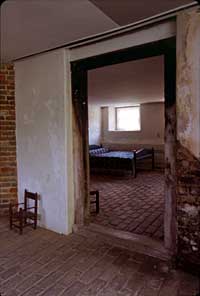
Henry is said to have confined
his mentally ill wife, Sarah Shelton Henry, to this basement room
at Scotchtown until her death. Then the floor was dirt, and the
chamber could be entered only through this sturdy interior cellar
door.
- Ellen Rudolph
Citizens of all classes were outraged by the appearance of privilege and favoritism. The colony was caught up in an outburst of complaint. Corbin-who as treasurer in 1775 would pay Henry for the gunpowder Governor Dunmore removed from the Magazine-took to the public prints to call Chiswell’s release “a rescue, under pretence of law, of a person charged with an atrocious crime.” Another writer told the Gazette that if the courts could not be trusted, Routledge’s friends would have to “take proper revenge.” A third correspondent said the “middle and lower ranks of men are extremely alarmed” and will “never permit the assassin, and his abettors, to pass with impunity.” Lawyer Wayles, who in 1771 would become Jefferson’s father-in-law, was accused of lying to the judges and was caught attempting to alter his testimony. Sheriff Thomas, too, was belabored for untruthfulness.
Corbin said that if, as he believed, the court had no authority to admit Chiswell to bail, it had, if he fled, no authority to collect it either and had thus had exercised “a power of licensing homicides.” Robinson’s defalcations, he said, threatened the safety of the people in their government, but, far worse, the actions of Byrd, Thornton, and Blair threatened the safety of the people in their persons.
In fact, Chiswell did leave town. He went back to his mine but returned September 11, more than two months before his trial date, vindicating the judges’ trust, if not their impartiality. But he may not have come home to take his trial.
Five weeks later, October 15, he was found dead on the floor of his house. The Gazette reported, “The cause of his death by the judgement of the physician, upon oath, were nervous fits, owing to a constant uneasiness of mind,” which sounded like a windy way of saying suicide. Some people, trusting the doctor no more than the lawyers or the judges, suspected a ruse. Chiswell, they said, might be on a ship bound for England.
His daughter, Robinson’s widow Susannah, directed her father be buried at Scotchtown. A mob gathered at the plantation, blocked the funeral procession, and demanded the coffin be opened. They would verify that the body-if there was one-was Chiswell’s. The lid was pried off, and the corpse’s blackened and distorted features examined. But doubters demanded further inspection by William Dabney, a relation of Henry’s and a cousin of Chiswell’s whom they trusted. Dabney peered into the box, affirmed that the remains were Chiswell’s, and the crowd dispersed while the colonel was laid to rest.
Widow Robinson held on to Scotchtown as long as she could. For three years, the burgesses sought to replenish the public accounts depleted by the late treasurer, whose estate-unless further steps were taken-could repay only £5,000. To raise more money, the Gazette announced in December 1769 that, “in obedience to the direction of the House of Burgesses,” two of Robinson’s properties were to be sold. These were Mount Pleasant, his plantation in King and Queen County, and “all that exceedingly valuable tract of land known by the name of Scotch Town, lying on New Found river in Hanover County.” Scotchtown’s 7,000 acres would be subdivided and auctioned.
Scotchtown, once the largest estate in upper Hanover, was a fine plantation. Its still-standing house is ninety-four-feet long and a story-and-a-half high. Two massive interior chimneys provide corner fireplaces for all eight first-floor rooms.
Henry had known of it since his early years. Sixteen miles north of Hanover Court House, where he had argued early cases, Scotchtown’s acreage, the Gazette reported, was “remarkable for producing the finest sweet scented tobacco which is eagerly sought after by cash purchasers and therefore at all times commands the highest price.” As he had risen in the world, Henry had yearned for just such a farm, and he would have it, though not quite yet.
John Payne, father of the future Dolly Madison, grabbed the 960-acre tract on which the Scotchtown house stood. But in 1771, he sold the property to Henry for a bargain £600. Henry was thirty-five, and he at last acquired a symbol of the Virginian of consequence he had set out to become six years before.
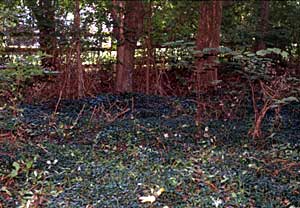
Chiswell’s Scotchtown grave
is unmarked. Photographer Ellen Rudolph, investigating the grounds,
noticed this patch of periwinkle, a plant often used for ground
cover in old Virginia cemeteries to keep down undergrowth. The
mounds and depressions the plant rolls over suggest old burials,
and their relationship to the house is right for a family plot.
Archaeological testing has been proposed to determine whether
interments can be verified without disturbing remains
--
Ellen Rudolph
Henry was living at Scotchtown in August 1774 when he was elected to the First Continental Congress in Philadelphia. It was his home in March 1775 when he rode to Richmond to attend the Second Virginia Convention and, at St. John’s Church, make his “Liberty or Death” speech. Scotchtown sheltered him in June 1776 when he was elected first governor of the Commonwealth of Virginia-by which time he eschewed rustic clothing in favor of velvet and a scarlet cloak. But the joy he took in the associations of property must have been diminished by the tragedy of his first wife, the former Sarah Shelton. After years of physical and psychological illness, which had forced Henry to confine her to the basement, she died in 1775.
Henry married Dorothea Spotswood Dandridge in October 1776. They lived in the Governor’s Palace at Williamsburg, where they had their first child, sold Scotchtown, and moved in 1779 to Leatherwood, a 10,000-acre plantation in Henry County, a county named in his honor. He retired from public life in 1791 to concentrate on paying off his debts and accumulating an estate for his children. He moved thrice more after Leatherwood, finally settling in 1794 at 700-acre Red Hill in Charlotte County, now the Patrick Henry National Memorial. He died there June 6, 1799.
Purchased in 1958 by the Association for the Preservation of Virginia Antiquities, the Scotchtown house has been restored, and Henry’s law office and kitchen reconstructed. The property opened to the public in 1964.
Alan Pell Crawford is the author of the book Unwise Passions: A True Story of a Remarkable Woman and the First Great Scandal of Eighteenth-Century America. This is his first contribution to the journal.
